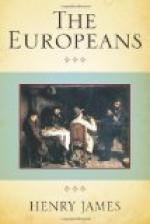She wandered for a while about the garden, vaguely and without purpose. The church-bell had stopped ringing; the stillness was complete. This young lady relished highly, on occasions, the sense of being alone—the absence of the whole family and the emptiness of the house. To-day, apparently, the servants had also gone to church; there was never a figure at the open windows; behind the house there was no stout negress in a red turban, lowering the bucket into the great shingle-hooded well. And the front door of the big, unguarded home stood open, with the trustfulness of the golden age; or what is more to the purpose, with that of New England’s silvery prime. Gertrude slowly passed through it, and went from one of the empty rooms to the other—large, clear-colored rooms, with white wainscots, ornamented with thin-legged mahogany furniture, and, on the walls, with old-fashioned engravings, chiefly of scriptural subjects, hung very high. This agreeable sense of solitude, of having the house to herself, of which I have spoken, always excited Gertrude’s imagination; she could not have told you why, and neither can her humble historian. It always seemed to her that she must do something particular—that she must honor the occasion; and while she roamed about, wondering what she could do, the occasion usually came to an end. To-day she wondered more than ever. At last she took down a book; there was no library in the house, but there were books in all the rooms. None of them were forbidden books, and Gertrude had not stopped at home for the sake of a chance to climb to the inaccessible shelves. She possessed herself of a very obvious volume—one of the series of the Arabian Nights—and she brought it out into the portico and sat down with it in her lap. There, for a quarter of an hour, she read the history of the loves of the Prince Camaralzaman and the Princess Badoura. At last, looking up, she beheld, as it seemed to her, the Prince Camaralzaman standing before her. A beautiful young man was making her a very low bow—a magnificent bow, such as she had never seen before. He appeared to have dropped from the clouds; he was wonderfully handsome; he smiled—smiled as if he were smiling on purpose. Extreme surprise, for a moment, kept Gertrude sitting still; then she rose, without even keeping her finger in her book. The young man, with his hat in his hand, still looked at her, smiling and smiling. It was very strange.
“Will you kindly tell me,” said the mysterious visitor, at last, “whether I have the honor of speaking to Miss Went-worth?”
“My name is Gertrude Wentworth,” murmured the young woman.
“Then—then—I have the honor—the pleasure—of being your cousin.”
The young man had so much the character of an apparition that this announcement seemed to complete his unreality. “What cousin? Who are you?” said Gertrude.




